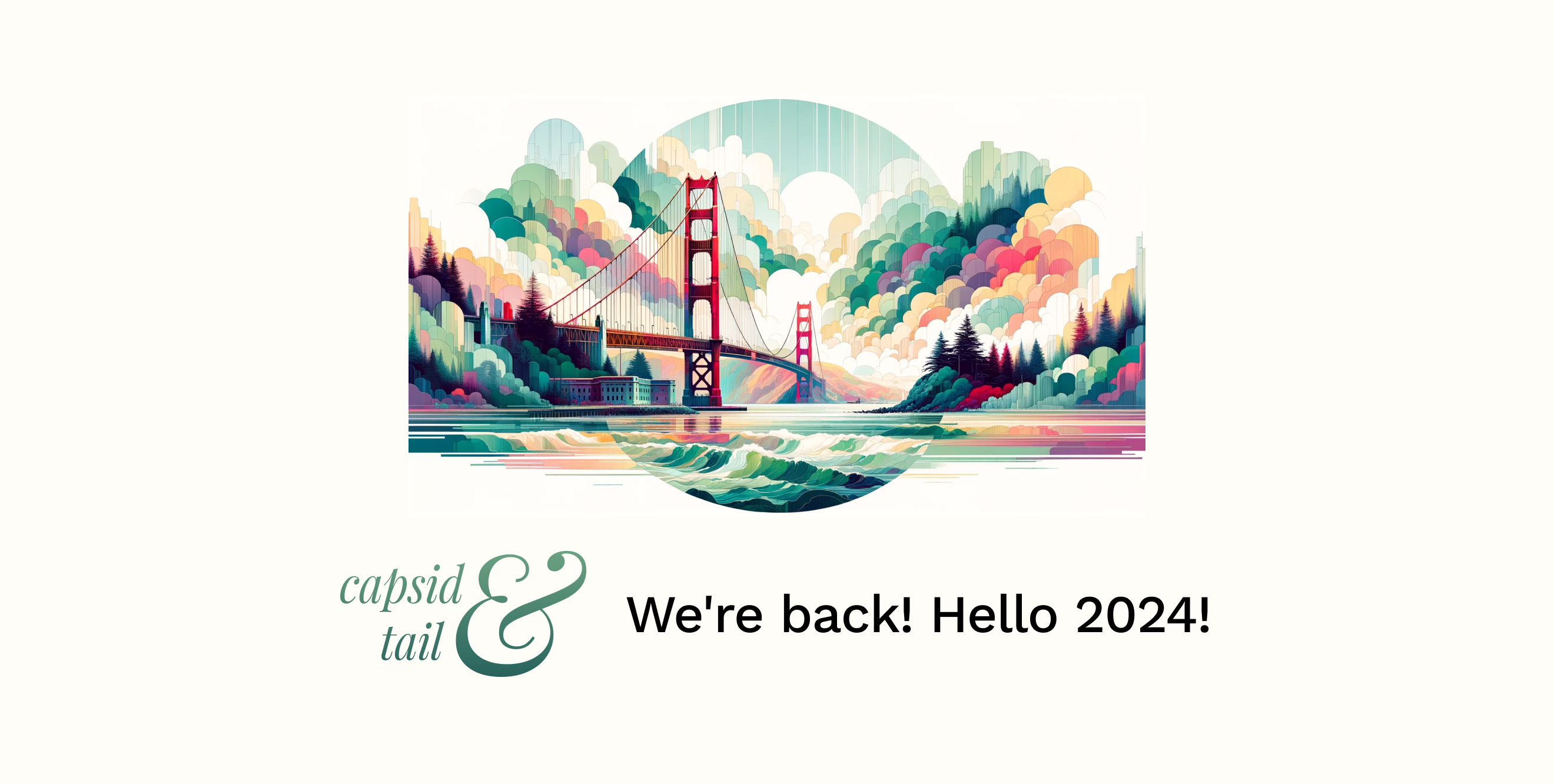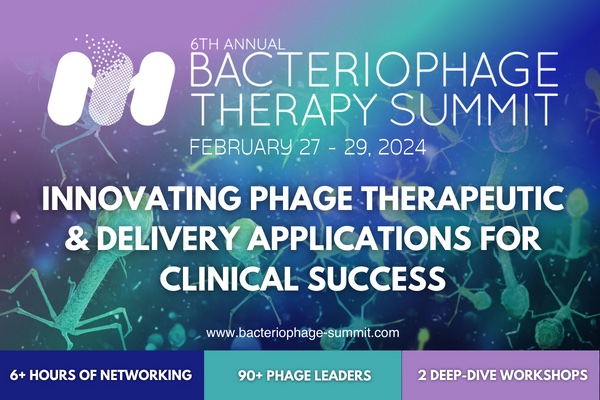Hello phage friends, we’ve missed you. Thank you for the break; we needed it! We’ve spent it packing up our apartment in Sydney, visiting New Zealand, getting our cat ready to cross the ocean, visiting my grandma in Hawaii, and most recently, setting up camp in San Francisco!
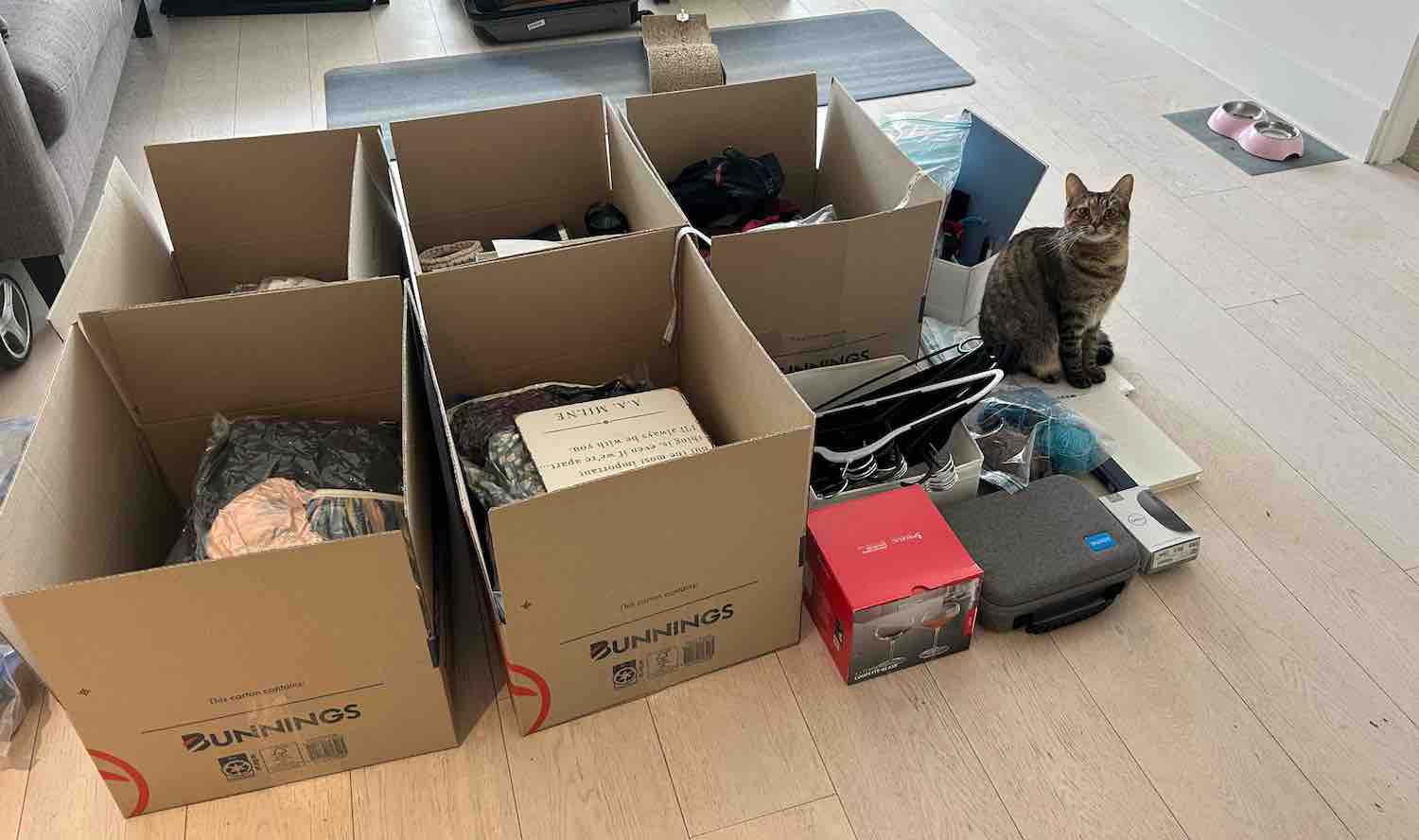
Mivi the cat, hoping we take her with us (and ideally never get rid of our cardboard boxes).
We’ve been able to land on our feet here thanks to the hospitality of some amazing (phage) friends like Tobi Nagel of Phages for Global Health, Paul Bollyky, and Jan’s awesome cousin Tim. Soon we’ll find our own spot, but for now it’s been great exploring various areas of the city, from downtown SF to Oakland to Palo Alto.
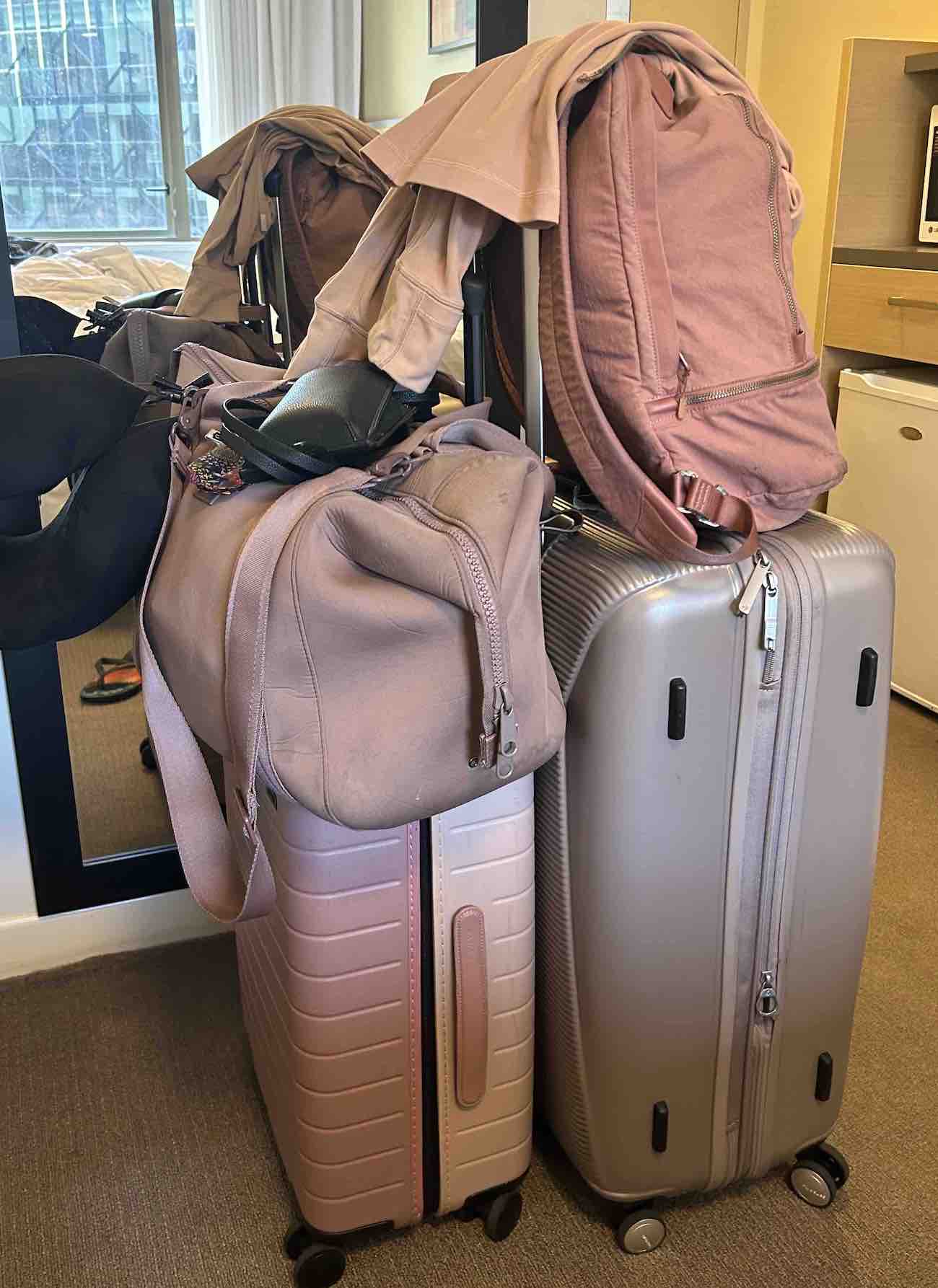
That moment when I realized everything I own has something in common.
It’s so cool to be here, and so surreal to see giant buildings with names we’ve only ever seen on the internet, like FitBit and SurveyMonkey and Away Bags… I also just learned that different neighborhoods in SF actually have very different weather, due to it being right between a bay and the ocean, and having lots of hills… so people aren’t joking when they list their houses as ‘in the sunny area’ or ‘in the foggy area’. So wild!
Leaving Sydney
We’re so sad to leave Sydney, but we’re simultaneously excited for the next chapter.
For those wondering why, it’s about 50% wanting to be on the same continent as our families at this stage of our lives, and about 50% wanting to be part of the AI(+bio) wave that’s happening in the San Francisco Bay Area right now.
While Jan’s been building clinical trial database infrastructure for the Phage Australia team, he’s also been spending his nights and weekends working to learn how to wield generative AI tools. All so he can ultimately integrate this new tech into our systems for collecting/learning from lab and clinical data. For this next phase, he wants to immerse himself in the epicenter of AI + bio knowhow, so he can keep building tools for (phage) scientists and physicians long-term.
Plus, our Australian adventure was always planned to be 2 years, so we’re ending right on the mark (though 2 years was definitely not enough!).
P.S. Sydney is a beautiful, special city and you should definitely go there — visit, do a postdoc, whatever it takes! It’s so relaxing, safe, clean, full of fantastic food and kind people who actually deeply believe in work-life balance — so liveable. (Plus we only saw about 4 spiders in our house in 2 years, and they were all very respectful).

Jan exemplifying Aussie work-life balance.
Reflecting on Phage Australia
The Phage Australia project was so much fun and so rewarding! It was actually life-changing to get to be a part of it, and I’ll never forget the kindness of everyone we met and the open-mindedness of the researchers, physicians, patients and families, and even the government representatives we met. It felt like everyone was ready to move things forward, ready to take steps (and sometimes leaps) and move the red tape aside for the benefit of the patients.
I think the fact that the STAMP clinical trial is well on its way now, and the fact that Australia is actively and publicly doing phage therapy and working toward a regulatory framework, has really made other similar countries (like my home in Canada!) take notice and start making real moves too. We’ve seen initiatives pop up and even adopt the same naming structure, which is pretty cool and powerful, like Phage Canada, Phage UK, Phage Nepal, and Phage Singapore, and some are working to adopt a version of the STAMP trial (or at least use it as a model/precedent that they can point their governments toward).
For more thoughts on this, I recently wrote a larger reflection on the last few years from Phage Directory to Phage Australia for The Microbiologist magazine. It may be paywalled for you, so let me know if you encounter issues and want to read it. Or stay tuned as we’ll be re-publishing it here in C&T soon.
Phage Australia by the numbers
I’m super proud that we were able to help create a system for producing purified personalized phages for patients in under two years. We treated the first patient with in-house produced phages in October 2022, and in the year that followed we treated a dozen more.
Here are some stats to date (detailed in this tweet thread):
- Fourteen patients’ phage preparations produced at Westmead Institute.
- Clinical responses were cure (2/14), partial response (8/14), or no response (4/14).
- Phage neutralization activity in serum was detected in 3/10 patients tested.
- No related serious adverse events occurred.
And of course these stats are changing fast — last I heard the team was prepping 9 phage treatments at once this month!
For this next phase, the team will be scaling up thanks to funds from the New South Wales government and some kind philanthropists. As we were leaving, an array of new team members had just begun joining the team (hopefully you’ll meet them soon — perhaps at VoM Downunder 2024?!). They’ll be awesome, and will no doubt help take the Phage Australia system to the next level in 2024 and beyond.
Our documentary is out!
Some of you may have heard that a documentary crew (led by Emma Watts at Genepool Productions) followed us and Jeremy Barr’s team in Melbourne around for the last two years. Excitingly, it just came out (on Aussie TV) last week!
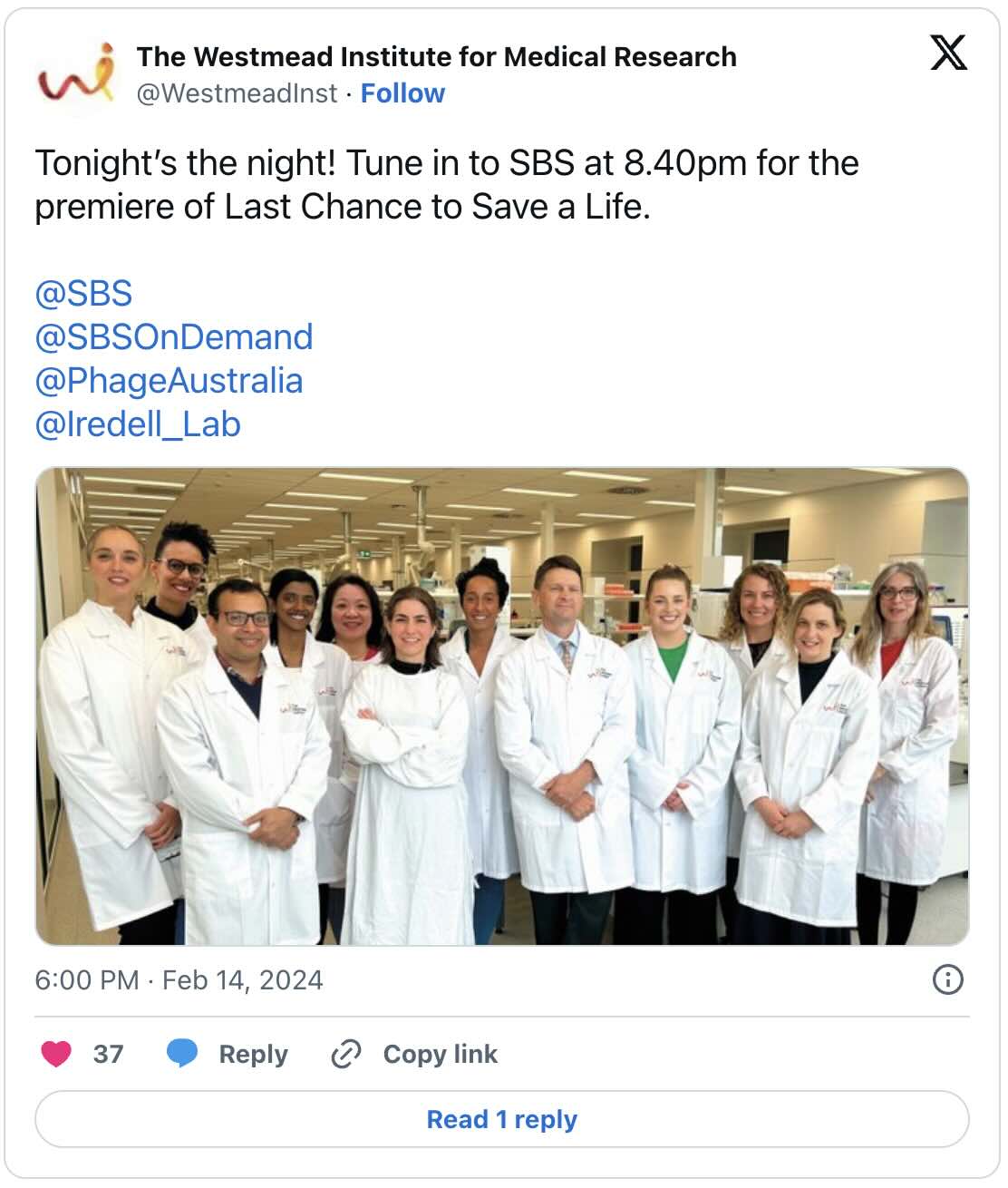
Tweet: https://twitter.com/WestmeadInst/status/1757947839374922231
The director wanted to follow patients receiving phage therapy from end to end, highlighting the patient, the physicians, and also the scientists screening and preparing the phages. They followed two patients who received phage therapy, one we treated at Westmead, one that Jeremy Barr’s team treated in Melbourne, and a third who sadly couldn’t get treatment. It does a great job highlighting the complexity of phage therapy, the needs of patients, how it can work, and its limits. (And you can see my unfortunate short haircut that I had at the beginning of our Aussie adventure).
(The film is currently only available for streaming in Australia — maybe you can watch it while you’re there for VoM 2024 this July!).
Here’s the trailer, which anyone can watch!
Until we meet again, Australia
So goodbye Australia, but also, it’s not forever! We made some lifelong friends and we’re excited to keep the collaborations going from here on out. We’re still figuring out what that will look like, but we’re all keen to keep working together.
Jan will likely still be working on data systems for the Westmead team, and I will likely continue helping with the team’s communications/liaisons with international phage groups, and helping the team source and exchange phages internationally (like Ben Temperton’s Citizen Phage Library, who shipped our team hundreds of phages recently!).
We’re keen to help Phage Australia continue to expand and share its insights with the phage community, and explore new partnerships along the way.
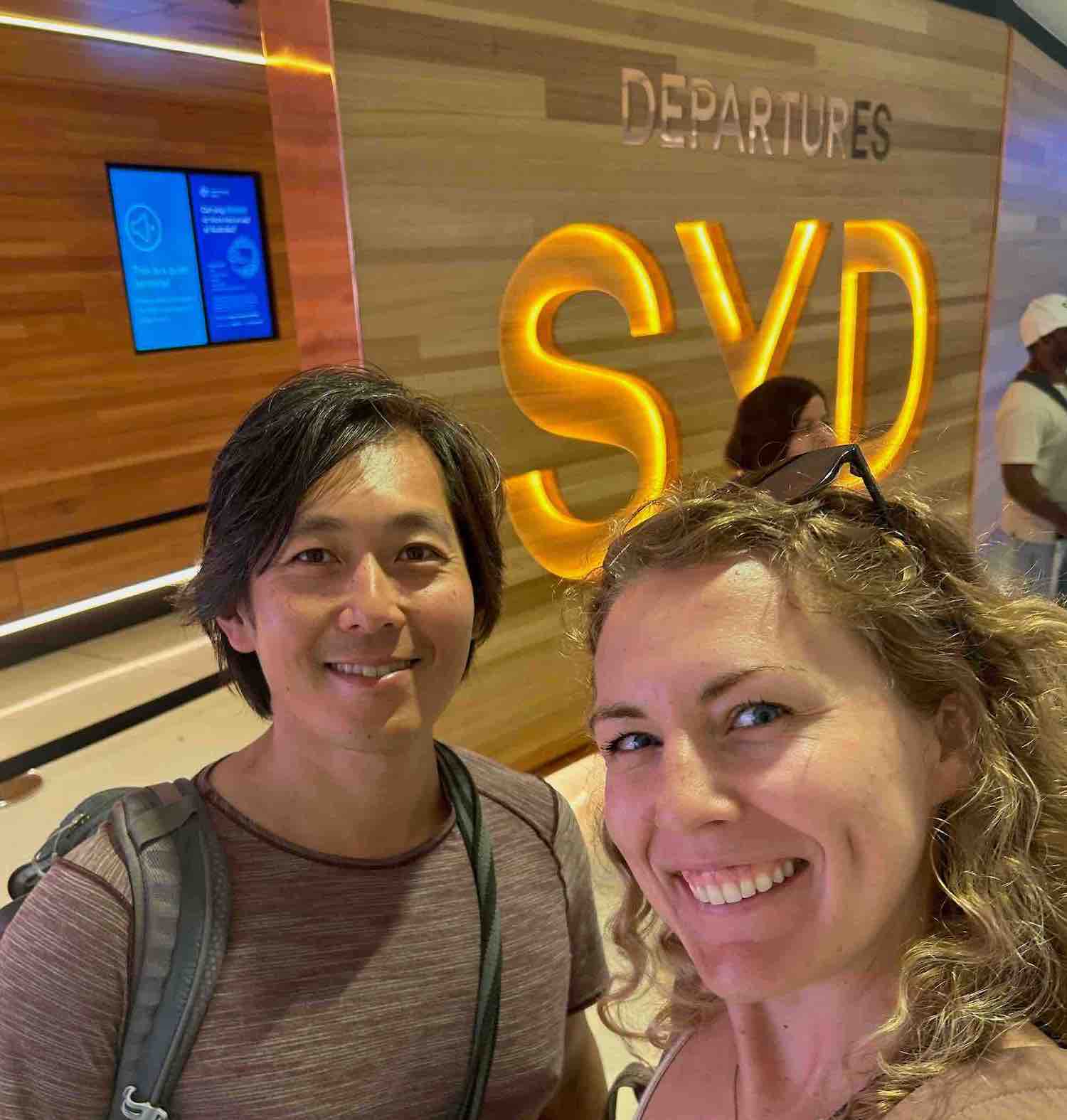
The end of an unforgettable era… we will miss you Sydney, and most of all we’ll miss our legendary Aussie friends and colleagues. We’ll be back to visit for years to come!
Now for the next chapter
We still don’t have the details locked down, but stay tuned for more official announcements very soon! For now, we’re in a bit of an exploratory/transition phase, doing things like:
- Organizing getting our cat, Mivi, sent over from Sydney (hopefully in a few weeks!)
- Figuring out where we should live in this ginormous place (Sydney absolutely SPOILED us with its public transit, we’re realizing… last week we actually took 3 Ubers in one day 😱)
- Jan is doing a bunch of projects with phage, AI, and data analysis! He’s currently helping Ramy Aziz, ICTV, BV-BRC to understand how protein language models (PLMs) could help annotate and characterize phage genomes.
- Capsid & Tail will resume! (Starting today!). We may experiment with some tweaks, though… so if you have feedback on what aspects you love or don’t, we’d be super grateful. Things like:
- What sections do you like best? (papers / jobs / community posts / events / feature blogs written by us / guest blogs)
- What format/style do you find most helpful/interesting? (roundups / blogs about lab progress / blogs about wrangling phage data / conference recaps / behind-the-papers / interviews)
- When/where/how often do you read C&T? Skim on the train or between incubation steps, or read with a coffee on the weekend?
- What other newsletters/blogs do you love? Have you seen other formats/creative ideas that we should try?
- One thing I want to explore more this year is going deeper into phage papers I read (almost like a journal club — let me know if you’d like to join me)
- In the spirit of group accountability, I also think I may try… gasp… recording a few podcast episodes (Jan wants to call it Podovirus, which I love…). I’ve got some conversations with phage folks that I really want to have, and I want to force myself to go much deeper into papers and topics, so I would use this as my own personal tool (but then share it with all of you). I’d love to also write up reflections/summaries of these conversations as blog posts here in C&T. Stay tuned!
Want to get involved in the phage community?
- If you want to volunteer with us at Phage Directory, we are always looking for writers, scouts (find us people who should write, find papers we should feature), social media assistants to attend conferences and help promote them, etc, let us know!
- Please don’t hesitate to send us announcements or papers you’re proud of, or nominate a colleague’s work for us to feature! Bookmark https://phage.directory/msg and plunk links/suggestions in the box whenever you think of it. Rough notes/scraps/links with no context are totally fine; we’ll format it for you before posting.
- If your company/org wants to sponsor phage directory or Capsid & Tail, we would love to help you highlight the work you’re doing to the phage research community, and we would thoroughly appreciate the support! It really helps to keep the engine turning on this phage machine. If you want to keep it extra simple, you can sponsor us via a banner on our website, or a brief blurb at the top of the newsletter, like Jafral, PHAGE Journal, Phage Futures, Bacteriophage Summit, and Cellexus have done over the years. Our sponsor page is here: https://phage.directory/sponsor
That’s it for now!
For now, we’ll keep this post light, just mainly as a way to say hello, we miss you, we’re excited to be back, and we’re sorry for all who we haven’t emailed back yet! Spending months living out of a suitcase is super fun, but I can’t wait to have a closet and consistent cell phone data again…
Here’s to an extra awesome 2024 full of new phagey surprises! Hope to see many of you much more from here on out, as we’re finally back within reasonable flying distance from so many of you!

